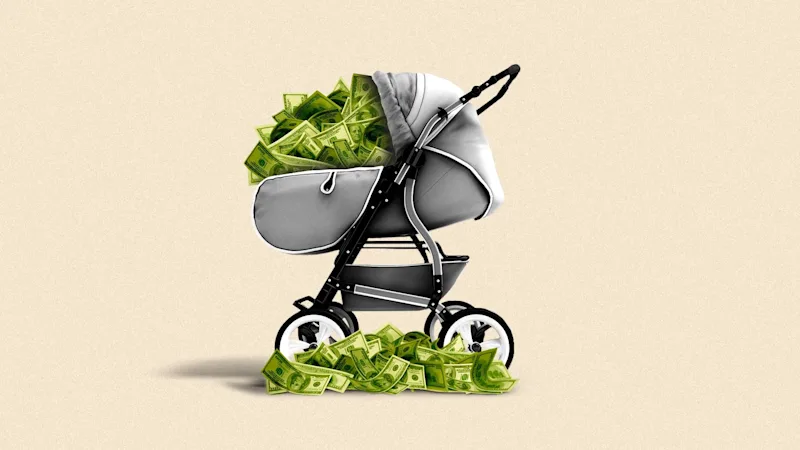Illustration: Aïda Amer/Axios
If you're expecting a baby this year, there's a new and unexpected factor impacting your baby registry: tariffs. In early 2025, the U.S. announced increased tariffs on goods imported from China, with some baby-related categories facing hikes as high as 100%. Translation? That stroller, crib, or car seat you’ve been eyeing may suddenly cost a lot more.
As if we didn’t have enough on our plate. Expecting parents are already navigating a world of rising costs, overwhelming product options, and pressure to “get it all” before the baby arrives. These new tariffs are making essential gear more expensive—sometimes by hundreds of dollars—forcing families to rethink what they buy, when they buy it, and how they build their registries.
Additional Source: Axios
The China Connection: Where Baby Products Are Made
It should come as no surprise that a significant majority of baby products sold in the U.S. are manufactured in China or components associated with that product are made in China. This reliance means that tariffs on Chinese imports directly impact the prices of these essential items. And the term you keep hearing, Baby Tax? That’s where it comes from.
Here's a breakdown of key categories:
-
Strollers & Car Seats: Approximately 97% of strollers and 87% of car seats sold in the U.S. are manufactured in China. WIRED
-
Cribs & Nursery Furniture: Around 80% of nursery furniture is produced in China.
-
Toys & Gear: China dominates global toy manufacturing, producing about 90% of toys worldwide.
-
Feeding Supplies: Many feeding products, including bottles and utensils, are manufactured in China, though specific percentages vary.
-
Baby Clothing: China remains a leading source for baby apparel, contributing a significant portion of the market.
Brand Impact: Who's Raising Prices?
Several well-known baby product brands have already adjusted their pricing in response to the new tariffs:
-
UPPAbaby: The price of the Vista stroller increased from $899 to $1,199—a 33% hike. Business Insider
-
Cybex: Announced price increases effective May 1, 2025, due to tariff impacts. WIRED
-
Munchkin: Reported suspending orders and facing challenges in sourcing products domestically. AP News
Could Brands Just... Not Raise Prices?
It’s a fair question, and one we think more parents should be asking: If tariffs are making products more expensive to import, couldn’t brands simply absorb the cost instead of passing it on to you?
Technically, yes. Brands could lower their profit margins, keep retail prices steady, and eat the tariff cost themselves. But here’s the truth: they almost never will.
Here’s why:
-
Public companies are accountable to shareholders. If profits dip, even temporarily, it can hurt stock prices and investor confidence.
-
Pricing is psychological. Once a brand lowers its price, it becomes harder to raise it again. Consumers anchor to the lower number. Most brands would rather increase prices and “blame” the tariff than risk setting a new (lower) pricing precedent.
-
Tariffs become a convenient excuse. In some cases, the cost increase from a tariff is marginal, but brands still raise prices significantly—knowing most consumers won’t dig into the math.
-
They’re not selling direct. Many brands sell through third-party retailers like Amazon or Target. They may not control the final price you see, but they do set wholesale costs—which often go up in response to tariffs.
The bottom line? Brands could prioritize the parent—but most will prioritize profit. So, what does this mean for your baby registry?
How To Manage Your Baby Registry in the Middle of Tariff Chaos
Poppylist was designed to support parents who want the right stuff, not more stuff. So, if you have a Poppylist baby registry, you’re already one step ahead. You’re intentional about what you’re adding to your baby registry, you care about product longevity and practicality, and you’re not above receiving a good hand-me-down.
But, there are other ways you can mitigate cost burdens for your gift givers and tips to keep your baby registry up-to-date in the middle of this trade war.
1. Turn On Group Gifting
If you’ve added big-ticket items like a crib, stroller, or monitor, enable group gifting. It allows your friends and family to chip in any amount they’re comfortable with—making generosity accessible, especially when budgets are tighter than ever.
2. Check and Update Your Prices
Because Poppylist doesn’t auto-update item prices, you’ll want to double-check high-impact categories like furniture, strollers, car seats, feeding gear, toys, and clothing. If the price has gone up and your registry doesn’t reflect it, we may be unable to fulfill the item once your gift-giver has purchased it. Pro tip: Always list the MSRP directly from the brand’s site.
3. Consider Secondhand—But Strategically
Retailers like GoodBuy Gear and Rebelstork let you register for open-box and gently used gear. The catch? Quantities are limited and inventory moves fast. If you love the idea but don’t want to risk item unavailability, add gift cards from these shops (in multiple denominations!) to your registry instead.
4. Add Flexible Gifts That Protect Against Price Spikes
Add gifts that hold their value no matter what:
-
Gift cards to trusted retailers, your favorite spa, coffee shop, etc.
-
Cash equivalents via Poppylist for later purchases
-
Service-based gifts like postpartum support, house cleaning, or food delivery—they're inflation-proof and always appreciated
Final Tip:
Keep checking your registry as prices shift—and remember, intentionality is your superpower.


